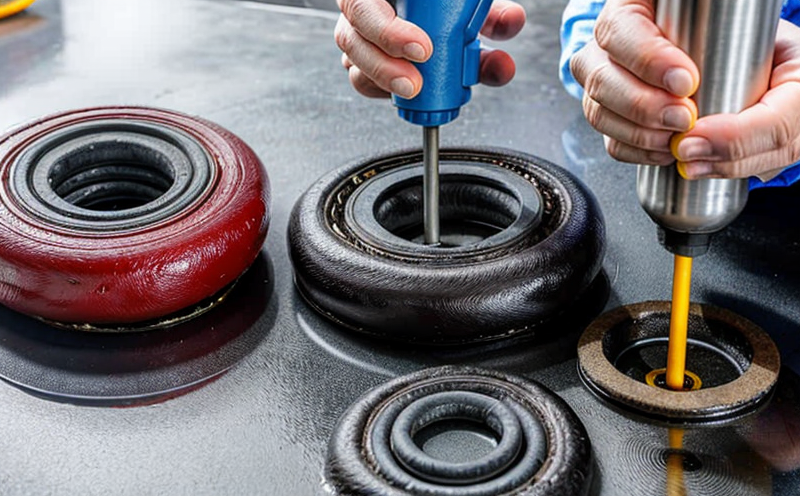Evaluating the performance of different sealing methods, such as heat sealing and induction sealing
Evaluating the Performance of Different Sealing Methods Unlocking Efficiency and Quality
In todays fast-paced manufacturing landscape, businesses are constantly seeking ways to improve their production processes, reduce costs, and enhance product quality. One critical aspect that often gets overlooked is the sealing method used in packaging operations. The right sealing technique can make all the difference between a successful product launch and a costly recall. Thats where Eurolab comes in our team of experts provides laboratory services to help businesses evaluate the performance of different sealing methods, such as heat sealing and induction sealing.
What is Evaluating the Performance of Different Sealing Methods?
Evaluating the performance of different sealing methods involves testing various packaging techniques to determine their effectiveness, efficiency, and reliability. This includes assessing the quality of seals, analyzing seal strength, and evaluating the impact on product integrity. By conducting thorough evaluations, businesses can identify areas for improvement, optimize their production processes, and ensure that their products meet industry standards.
Why is it Essential for Businesses?
In an era where consumer expectations are high, and regulatory demands are increasing, evaluating the performance of different sealing methods has become a crucial aspect of product development. Here are just a few reasons why
Quality Control Evaluating sealing methods ensures that products are properly sealed, reducing the risk of contamination, spoilage, and recalls.
Cost Savings By optimizing production processes, businesses can reduce waste, minimize rework, and lower costs associated with defective products.
Compliance Meeting regulatory requirements for packaging and labeling is essential. Evaluating sealing methods ensures compliance with industry standards and regulations.
Brand Reputation A well-executed sealing process helps maintain a positive brand image by ensuring that products meet quality expectations.
Heat Sealing A Comprehensive Overview
Heat sealing is a widely used packaging technique that involves applying heat to bond two materials together. This method is commonly employed in various industries, including food, pharmaceuticals, and personal care.
Advantages of Heat Sealing
Flexibility Heat sealing can be used on various materials, including plastics, metals, and papers.
Speed Heat sealing machines are often fast and efficient, making them suitable for high-volume production runs.
Cost-Effective Compared to other sealing methods, heat sealing is generally cost-effective.
Induction Sealing A Secure Solution
Induction sealing involves using electromagnetic energy to seal packages, creating a hermetic bond between the cap and container. This method is ideal for products that require a high level of security and tamper-evidence.
Advantages of Induction Sealing
Security Induction sealing provides an effective barrier against contamination and tampering.
Versatility Suitable for various materials, including glass, plastic, and metal containers.
Sustainability Reduces waste by eliminating the need for additional packaging materials.
Other Sealing Methods A Brief Overview
While heat sealing and induction sealing are two of the most popular methods, other techniques include
Ultrasonic Welding Uses high-frequency vibrations to create a bond between materials.
Laser Sealing Employed in various applications, including food packaging and medical devices.
Compression Sealing Suitable for products that require a tight seal, such as pharmaceuticals.
QA Your Guide to Evaluating Sealing Methods
Q What types of products benefit from evaluating sealing methods?
A Any product that requires effective packaging, including food, pharmaceuticals, personal care items, and medical devices.
Q Why is it essential to evaluate sealing methods in-house?
A Conducting evaluations internally allows businesses to identify issues and optimize production processes before mass-producing products.
Q What are the benefits of using a laboratory service like Eurolab?
A Our team of experts provides unbiased, comprehensive testing services that help businesses make informed decisions about their packaging operations.
Q Can I evaluate sealing methods on my own equipment or materials?
A While its possible to conduct preliminary evaluations in-house, using an external laboratory service ensures accuracy and objectivity.
Conclusion
Evaluating the performance of different sealing methods is a critical aspect of product development that can make all the difference between success and failure. By partnering with Eurolab, businesses can trust that their packaging operations are optimized for efficiency, quality, and compliance. Dont let inadequate sealing methods compromise your products or brand reputation contact us today to learn more about our laboratory services.
Key Takeaways
Evaluating sealing methods is essential for ensuring product integrity, reducing waste, and maintaining regulatory compliance.
Heat sealing and induction sealing are two popular methods with unique advantages and applications.
Other sealing techniques, such as ultrasonic welding and laser sealing, offer specialized benefits in various industries.
A laboratory service like Eurolab provides unbiased testing services to help businesses optimize their packaging operations.
By staying informed about the latest developments in sealing technology and evaluating the performance of different methods, you can ensure that your products meet industry standards while maintaining a competitive edge in the market.




